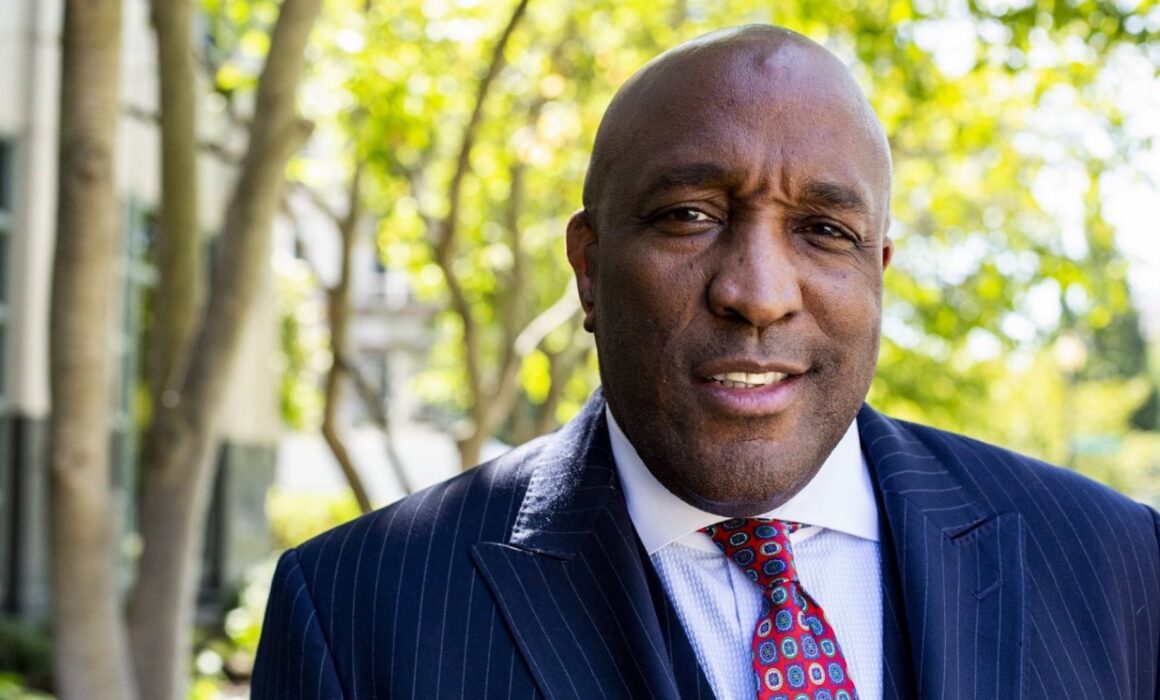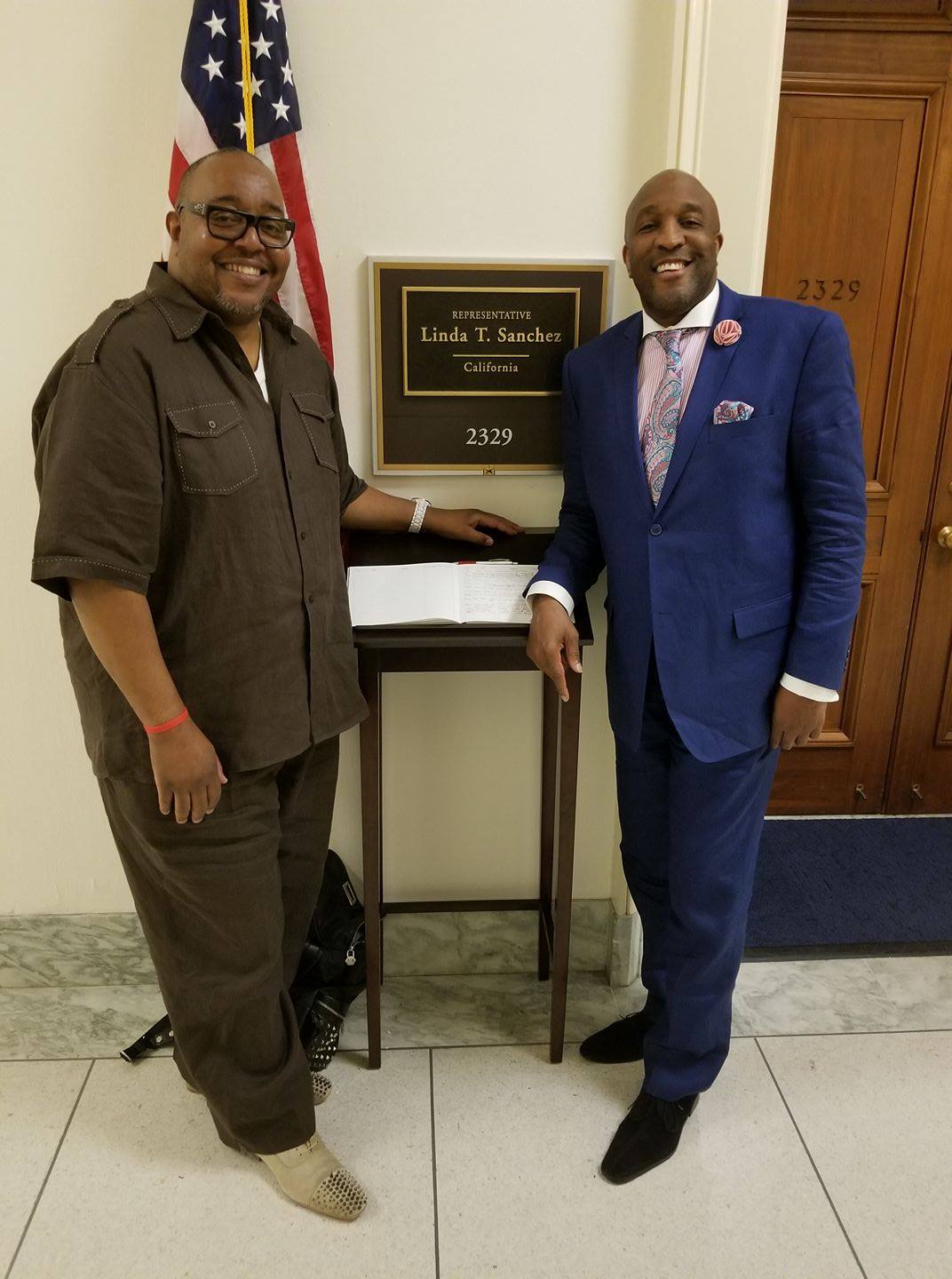
CCA and the CCA Board of Directors regret to announce the passing of longtime Board Director Julius Thomas, a faculty member in counseling at Rio Hondo College (Whittier). He had served in various positions in CCA and CTA as well as serving as one of the NEA Directors from California on the NEA Board. In 2021, he was awarded the prestigious NEA Higher Educator of the Year Award for championing faculty and student rights as well as the NCHE’s James Davenport Memorial Award for service to the union. Julius most recently served as the Southern BIPOC Director on the CCA Board. He leaves behind family, friends and colleagues. He is fondly remembered by all those who had the privilege to know him.
In an interview with CTA Board Member DeWayne Sheaffer, he shares what he remembers about his longtime friend and colleague. In this interview, you will learn more about Julius’ work and the legacy he left behind.
How long have you known Julius?
I met Julius at a CCA Conference in 1998. I believe he was working at Pasadena College. This was before he joined the faculty at Rio Hondo College. He shared with me the story of wanting to enter the community college system after working at the Los Angeles County office (LACO) specializing in working with teens in the juvenile system. He enjoyed the work; however, the pay was substandard. He and his brother decided to invest time into landing a counseling faculty position at a community college. They looked for several months in Southern California only to be discouraged by the small employment offerings available. They were so committed to working at a community college that they went to the California Community College Job Fair in Northern California. As I said, committed! They both ultimately found opportunities in Southern California. He at Pasadena then Rio Hondo and Antoine at Mount San Jacinto and then Mount San Antonio College. Both working as counseling faculty.
What roles has Julius held with CCA and beyond CCA?
Julius had most recently held the position of BIPOC South Director on the CCA Board. This position and others were created due to the CCA Council recommendations. CCA had only one category of north and south directors which were the part-time faculty positions. There was a women’s director, a minority director and an LGBTQ director. Neither of these were north nor south. The CCA Council came up with a motion to have a north and south LGBTQ, women’s and BIPOC director positions. This motion passed unanimously. Julius also served as the NEA Higher Ed Board Director from California. NEA directors are awarded to each state based on total membership and do not dictate how each state would designate the seats. California, to my knowledge, is the only state that has a dedicated Higher Ed designation for one of the NEA California seats. Julius held this seat for six years. In this role, he worked well with all NEA directors from every state. No matter the director’s political views, he found common ground to build a friendship.
Julius was the type to meet and greet each person where they were. There were times when I could not work well with someone, and he would always remind me to be patient. He also held a position within his local union at Rio Hondo. He was well respected by his peers, and they trusted his union perspective.
What impact has he had on your life?
Julius served as the big brother I never had. As an only child, I was always looking for a friend and one who would be honest with compassion. That was Julius to me. I was not interested in taking the place of his actual brother who knows me, and we communicate to this day. Julius would encourage me to run for various positions within the union. I had no intention of becoming president of the National Council for Higher Education. He and another colleague said you could do this. I trusted them and they both continued to work with me. When the at-large higher ed NEA Board seats became available he networked and encouraged me to run for the position. In this capacity, we both worked on higher education issues and representation within the national association.
Not only were we union brothers, but we were also family. We talked about our respective families and the instruction we received from our mothers and fathers. We emphasized the importance of understanding that failure is not an option and that mistakes do not define you. Being the first Black men to enter several positions, we were able to talk about the roadblocks and perceptions and rise above them anyway. We talked weekly regarding today’s current events or union issues that were mounting and worked on developing a plan of implementation. It was apparent that wherever we went we were together. Facebook at one time posted that Julius and I were together 40 times during a particular year. Facebook had pictures to document the moments we were together doing the work. I was surprised and I shared the statement with him, and he laughed and said we are together a lot. We both loved to dress and shop. We would share our favorite haunts and compare the price of what we paid for items. He would only purchase shoes if there was a coordinated belt available. I, on the other hand, did not care. But there were times we would be admiring the attire we each were wearing at a given moment.
Julius was running for coordinated NEA/CTA Director. The person introducing him stated that he was the best-dressed delegate at State Council. I was present and stood up in protest, which brought on much laughter and a retraction that the introducer made from the podium. Others placed us in the category of best dressed. We both enjoyed men’s fashion and shopping for ourselves.
What contributions has he made to public education?
Julius was very interested in social justice. I did not know he majored as an undergrad in sociology and psychology. This makes so much sense now because his comments were tailored from that lens. Of course, he was an athlete. He played basketball and at one time was contemplating becoming an NBA official. So much so that he took classes and auditioned for the position. He was very close and then decided to change.

From left to right: NEA Executive Committee Member Christine Sampson-Clark, DeWayne Sheaffer, NEA President Becky Pringle and Julius B. Thomas
What legacy does he leave behind?
One of the biggest legacies I see he made to NEA is that there was an issue that was disturbing on many levels that he called out and directed his comments to an individual. The issue became so pronounced at a NEA Board meeting that a healing circle was called together. He participated in the healing circle which started the healing. He also called out that there needed to be agreements made with all in attendance. This is most often called NORMS. The agreements were created by those in the room. Those agreements are still in play today and are reviewed at each NEA Board meeting.
What will you remember about him?
I will remember the knowledge he had on various issues. He never tried to make anyone feel less than and recognized that all points of view are important and need to be in the room. He would travel from zero to 60 in a matter of seconds on an issue. However, when he calmed down, he could speak about the matter with compassion and information. I reflect on the times I would be present for one of those moments when I could calm him down and bring him back to zero. This did not happen in a way to control him, but to encourage him to slow down and see the other side. That did not happen a lot, but it did. I will miss our fashion discussions when we attended several formal events together. He was conservative in dress, and I was not. However, there will be times when we enjoyed the ensemble we created and had fun with fashion. I did not know he had men’s fashion catalogs coming to his Rio Hondo faculty office. WOW! His loud laughter and his love of food.
What moments would you like to share about him?
Though we were not blood brothers he accepted me wholeheartedly and all as I did him. We would have differences of opinions, but we never argued. We wanted to be involved in the union as we both knew the importance of a union for Black men. Though being in a progressive state like California we needed protection. We were both tried by our administration and leadership in state organizations. However, we did not let that define us, mistake or not. We were each other’s wind beneath our wings. What one accomplished we both celebrated but continued to keep our eyes on the prize. I have several other union brothers and sisters who are very important in my life. However, none like Julius! He is a rare breed and gone much too soon. When Julius passed it was made clear how important our friendship was to others. So many cards, text messages and words of encouragement were given to me.

The Discussion 0 comments Post a Comment